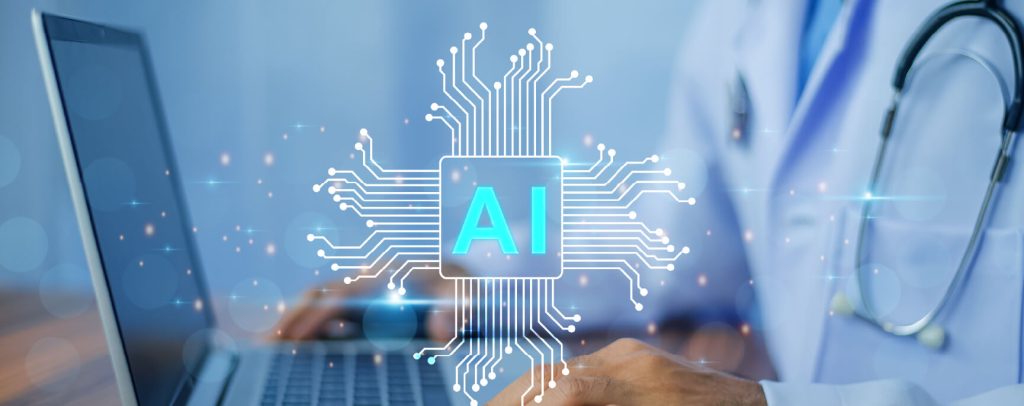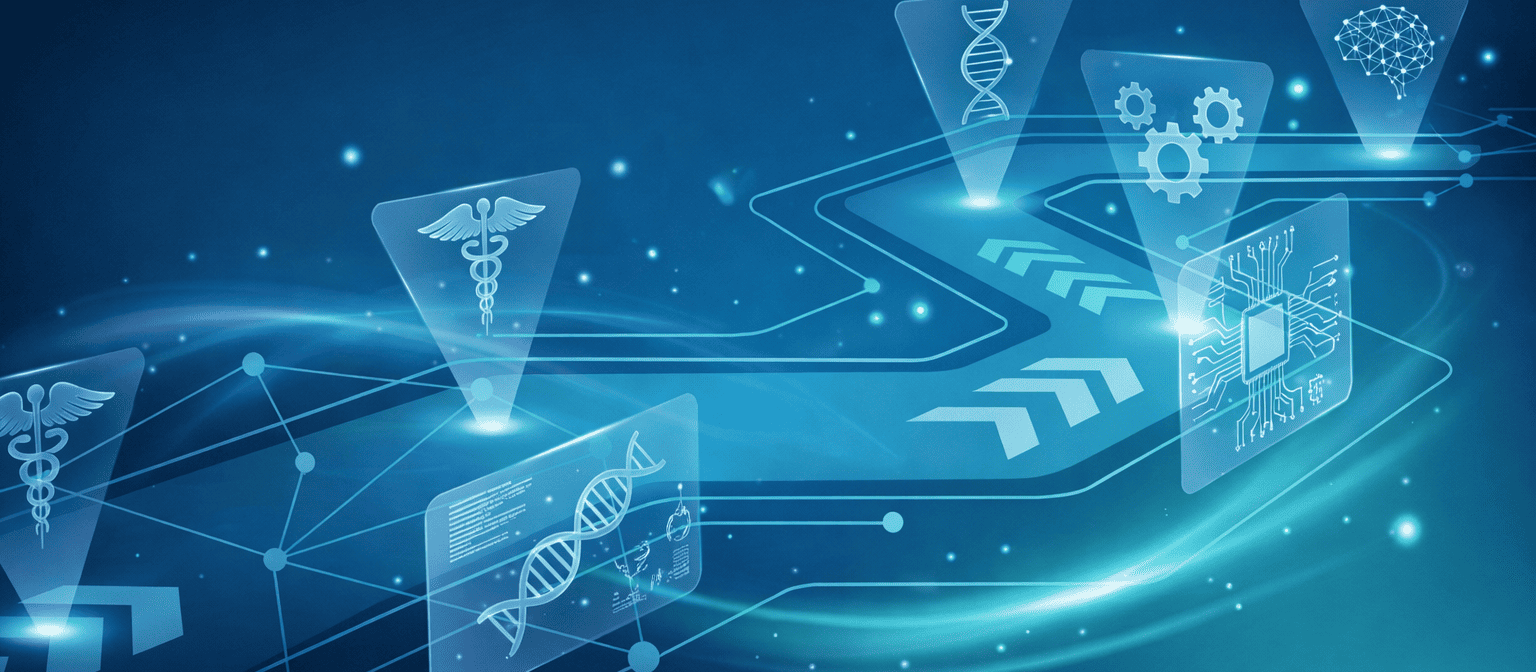RPA and AI in Healthcare : Use Cases, Benefits, and Trends
Why do we need RPA and AI in healthcare? Well, medical errors kill more than 200,000 Americans a year. Worldwide healthcare expenditures has reached $10 trillion in 2025. We have been at a tipping point for some time now. The industry is currently ensnared in a tough “trilemma,” a three-way squeeze that is pushing resources to their breaking point.
We’re facing a perfect storm of skyrocketing operational costs, a critical shortage of healthcare professionals that’s fueling burnout at an alarming rate, and patients who now expect the same slick, digital experiences from their doctors that they get from every other service. These aren’t just isolated problems; they’re deeply connected issues that are creating a system on the verge of collapse.
This is where the powerful duo of RPA and AI in healthcare comes in. By merging these technologies, we can directly tackle these core challenges. This isn’t just about patching up the old system; it’s about building a new foundation for a more sustainable, efficient, and ultimately more human healthcare system for the future.
Understanding RPA and AI in Healthcare
RPA uses computer “bots” to mimic human action and execute rule-based, repetitive digital tasks. It is a 24/7 employee who never makes a mistake. The bots are able to execute tasks such as signing in to software programs, filling out forms, copying and pasting data, and doing calculations. In a healthcare setting, RPA bots for patient data processing are the workhorses that execute tasks such as scheduling, billing, and transferring data between systems, doing so with unblemished accuracy and speed.
AI, on the other hand, gives systems the ability to “think” and “learn.” AI gives computers the ability to perform tasks that require human-like intelligence, such as understanding language, pattern recognition, and prediction. Healthcare AI products excel at handling complex, unstructured data. This involves reading medical images, predicting patient readmission risk from EHR data, and reading physicians’ notes with Natural Language Processing (NLP).
This convergence of technologies has given rise to hyper automation in healthcare; capable of executing complex tasks such as clinical documentation, scheduling of patients, processing claims, and even clinical decision support. In contrast to pre-defined rule-based automation, AI-based RPA systems have the ability to learn from various scenarios and improve over time.
Benefits of RPA and AI Implementation in Healthcare
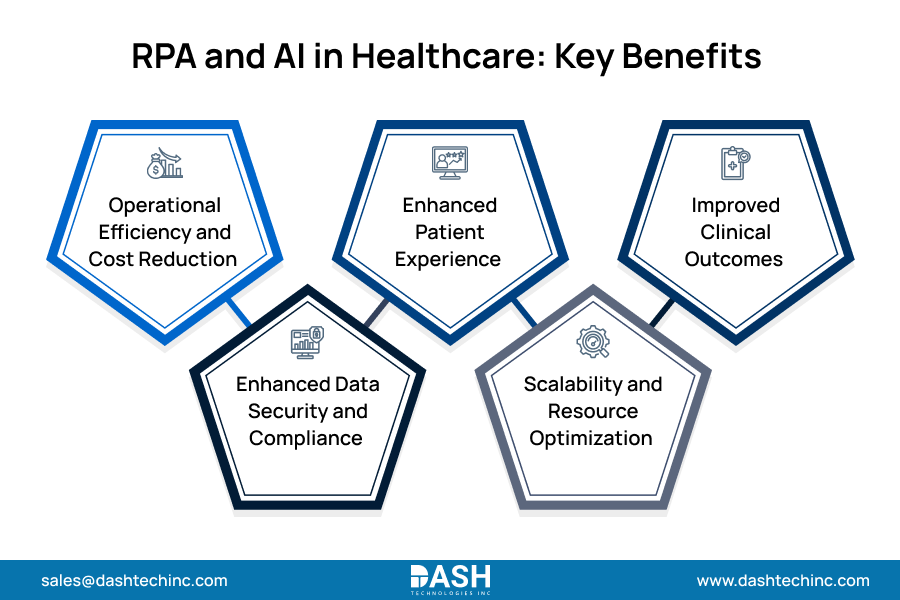
Operational Efficiency and Cost Reduction
The implementation of healthcare automation delivers substantial operational benefits. Org experience reduced administrative expenses by decreasing the workforce necessary for routine functions, while also increasing the accuracy and speed of those processes.
RPA bots for patient data processing can operate 24/7 without a single interruption, delivering high-volume & consistent accuracy. Healthcare AI solutions allow businesses to process a larger number of patients without a corresponding increase in staff costs.
Enhanced Patient Experience
Improving the patient’s experience is a direct result of AI in hospital workflow optimization. Features like automated appointment scheduling, reminder systems, and streamlined registration processes can help minimize wait times and administrative hassles for patients.
LLM chatbots in healthcare are particularly effective at handling patient inquiries, appointment scheduling, and providing basic health information around the clock. Reducing administrative burden and streamlining workflows can also free up staff to focus more time on patient care, which can lead to improved patient satisfaction scores and clinical outcomes.
Improved Clinical Outcomes
AI-powered healthcare solutions improve clinical decision-making by offering real-time access to patient data, evidence-based treatment guidelines, and predictive analytics. These tools help healthcare professionals make more informed decisions and spot potential problems earlier.
AI-powered diagnostic tools also lead to better treatment outcomes and lower mortality rates by spotting diseases earlier and with greater precision than conventional methods.
Enhanced Data Security and Compliance
Healthcare automation significantly enhances data security and regulatory compliance by implementing standardized processes and automating audit trails. RPA bots in healthcare process patient data, eliminating human errors that are likely to lead to data breaches and ensuring uniform compliance with HIPAA & other healthcare regulations.
AI in optimizing hospital workflows enables real-time surveillance and anomaly detection, which identifies potential security threats before they pose a risk to sensitive patient information. This computerized compliance management ensures patient trust and minimizes the likelihood of expensive penalties.
Key Use Cases of RPA and AI in Healthcare
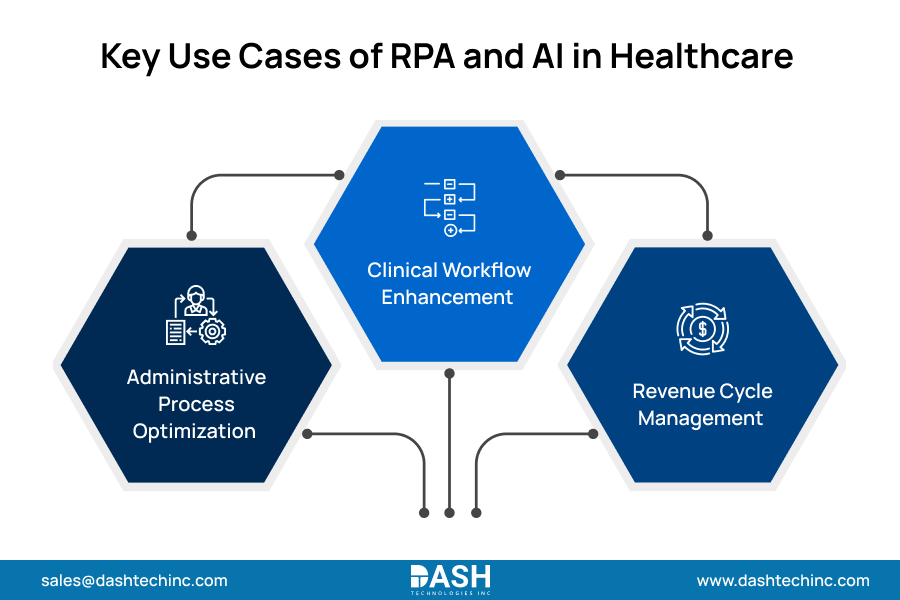
Administrative Process Optimization
A digital workforce in healthcare that handles patient data can help organizations automate their administrative processes. The rules that these bots follow are designed to enable them to handle patient registration, insurance eligibility, and appointments. Schedule an appointment with up to 80% less time spent through RPA and with real-time availability updates across systems.
The claims process is another area in which automation can bring value. Manual data entry errors and a lack of system integration across hospitals, clinics, and other entities make claims processing a painful and time-consuming experience. With automation using RPA software, tasks such as data entry, insurance verification, and claims processing can be performed with greater accuracy than humans. This means fewer denials and faster reimbursements.
Clinical Workflow Enhancement
AI in hospital workflow optimization extends beyond administrative tasks to clinical operations. AI systems are able to analyze patient information and forecast possible diseases and thus intervene in advance. AI algorithms, for instance, can track patient vital signs and notify healthcare professionals of possible complications before they turn critical.
Healthcare AI technologies are revolutionizing diagnosis. AI systems can analyze medical images, lab results, and patient histories to identify patterns that may not be apparent to human analysis. Research has demonstrated that AI diagnostic tools can achieve accuracy rates of 90% or higher in detecting certain conditions, such as lung cancer, and can sometimes outperform human interpretations.
Revenue Cycle Management
The revenue cycle represents a complex web of processes that have a significant impact on the financial health of healthcare organizations. RPA and AI technologies improve these operations by automating billing, denial patterns tracking, and regulatory compliance. Automation of these functions could potentially reduce accounts receivable days and improve overall financial performance.
Implementation Trends and Future Outlook
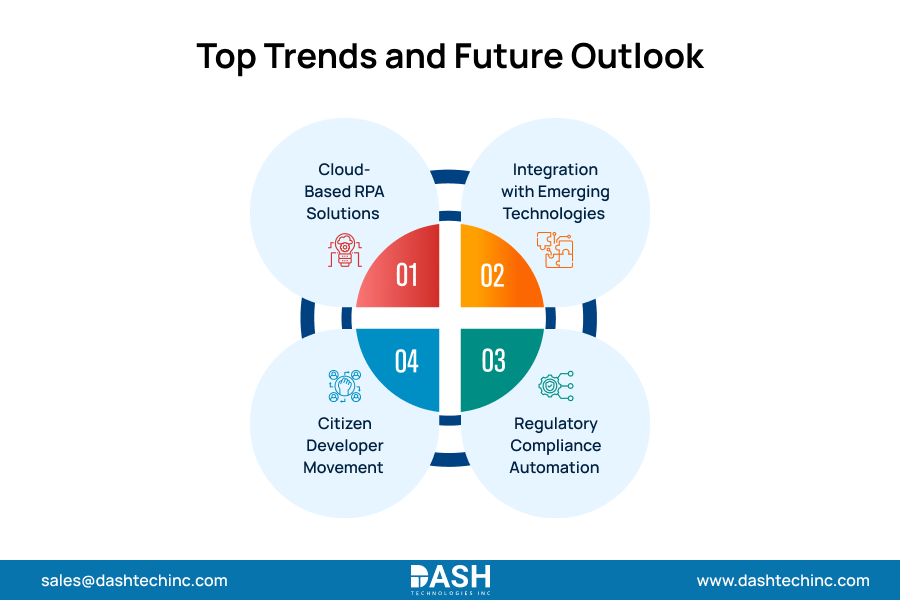
Cloud-Based RPA Solutions
Cloud-based RPA solutions are increasingly being turned to by healthcare orgs, as it offer scalable and flexible solutions that do not need significant infrastructure investments. These healthcare automation tools allow for a phased implementation that starts with a pilot program and gradually scales up as and when needed based on the results and business needs.
Integration with Emerging Technologies
Hyper automation in healthcare represents the convergence of RPA, AI, machine learning, and other technologies into comprehensive automation ecosystems. This integration delivers sophisticated decision-making capabilities and enhanced adaptability to evolving healthcare requirements.
Citizen Developer Movement
Healthcare organizations are empowering clinical staff to become “citizen developers” using user-friendly RPA tools. This democratization of automation development ensures that solutions are closely aligned with the actual needs and solves the challenges faced in clinical settings.
Regulatory Compliance Automation
As regulations get more and more complex, RPA systems that are being deployed help in the automation of compliance tracking and reporting. These systems not only track regulatory changes but also re-engineer processes to ensure ongoing compliance with evolving standards in the healthcare sector.
Final Thought
The path to successful full-scale healthcare automation will require careful planning, stakeholder engagement, and a commitment to ongoing evaluation and improvement. Organizations that adopt these technologies thoughtfully and strategically will be well-positioned to provide high-quality, efficient, and patient-centered care in the future. Transforming the care services market through healthcare innovation shows how technology can change entire sectors of the industry.
Ready to transform your healthcare operations with AI solutions for healthcare? Dash Technologies specializes in implementing RPA and AI solutions that drive efficiency, reduce costs, and enhance patient care. Contact us right away!
About Dash

Dash Technologies Inc.
We’re technology experts with a passion for bringing concepts to life. By leveraging a unique, consultative process and an agile development approach, we translate business challenges into technology solutions Get in touch.
